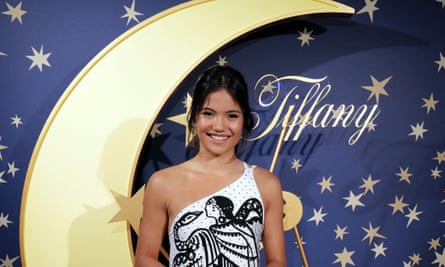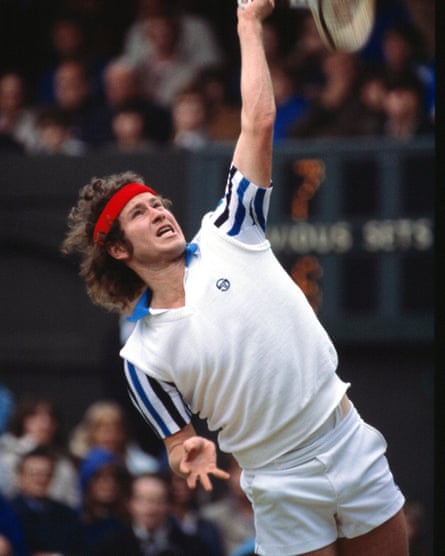Most sporting events have their own “catwalk” these days. The Premier League has its team bus-to-changing room stride, and the NBA its “tunnel fashion”.
At Wimbledon, it’s the corridor-to-court walk. But when Jannik Sinner, the 21-year-old Italian and men’s world No 8, emerged from the tunnel carrying a leather-trimmed canvas duffel bag covered in Gucci’s GG monogram, something felt different.
Could it be that Wimbledon’s all-white, logo-lite rule creep had been overthrown by a 6ft 2in redhead yet to win a grand slam title?
The grand slams have rigid rules. No sweatshirts, even in the warmup. Want to wear your own grass shoes? You need to submit a pair 90 days before stepping on to court. But none more so than at the All England Club, where, staggeringly, 2023 is the first year women are allowed to wear dark-coloured shorts in case they have their period. Otherwise, the all-white rule is largely obeyed.
“The amount of work it took to get that bag out on to Centre Court was truly something,” says Hikmat Mohammed, an editor at Women’s Wear Daily. “But high fashion finds a way to adapt to anything. I imagine Gucci saw the giants of sport – Nike and Adidas – and how they’ve benefited from deals, and thought: why not try?”
That, Mohammed says, was partly down to the Emma Raducanu effect: “I imagine the big brands all sat up when Emma started signing [as brand ambassador] to Dior and Tiffany in 2021.”

Since René Lacoste introduced the logo polo shirt in the 1920s, players have pushed the stylistic boundaries of the game’s more traditional rulebook. Arthur Ashe plumped for graphic tops and oversized shades during the late 1970s. John McEnroe wore his Sergio Tacchini microshorts with a headband a decade later. Andre Agassi was so attached to his colourful kit that he refused to play at Wimbledon from 1988 to 1990 because of the all-white rules.
Sinner, who became an ambassador for Gucci last year, has rarely pushed the sartorial envelope on court – he prefers white, as a rule. But according to the Italian label, this bag was the “first time a high-end luxury luggage piece has been brought on court”.
As the BBC commentator James Burridge said during Sinner’s match against Quentin Halys on Friday: “He’s become the talk of the locker room – a style icon.” That the bag then sits courtside for several hours is a handy bit of promotion for the brand, too.

Stuart Brumfitt, the editor of tennis magazine Bagel, thinks this pushback in men’s tennis is inevitable as the new guard – he counts Carlos Alcaraz and Holger Rune alongside Sinner – begin to displace the likes of Rafael Nadal and Roger Federer.
“Tennis players have always had that fashion association but it’s not talked about in the same way as, say, footballers,” Brumfitt says.
“I think a lot of it comes from their engagement on social media, and being more open in press conferences. You’re seeing a return of character players. There’s pressure on them to become personalities, and their clothes tie into this.”
There is also competition from newer games including pickleball and padel, says Brumfitt, with fashion brands such as Varley and Staud releasing pickleball clothing. Tennis has responded: Danish clothing line Ganni has collaborated with the tennis brand Prince, and Slazenger with the menswear label Percival.
after newsletter promotion
Brumfitt put Frances Tiafoe, the 25-year-old American tennis player, in a basketball top on the Bagel cover, “because that was what he wore to train in”. “I’m not a stylist but I want to capture the casualness and the reality of tennis, which is not all white caps.
“Young players seem aware of how they look off-court,” Brumfitt says. Alcaraz has been doing press conferences in a bucket hat; the French-American Maxime Cressy has become famous for his beard and chain; even the British player Cameron Norrie is flashing a blond streak in his hair.
The Australian player Nick Kyrgios, absent this year because of injury, wears red Air Jordans (which he changes out of on court), a baseball cap and has double loops in his left ear.

But breaking from tradition has largely been a women’s game. “They have always pushed for a more flamboyant style, and I think there’s been more of a focus on them,” says Brumfitt, referring to Serena Williams, the catsuit controversy of 2018 and her predilection for Off-White tennis dresses, but also Suzanne Lenglen and her hemlines and tennis bracelets.
Tennis style for men has been slower on the uptake, but now tends to go one of two ways: heritage or future-facing, says Brumfitt. Sinner is going for the “old-school look, a bit like Federer”. It’s telling that Alcaraz is sponsored by Louis Vuitton, a rival brand from a rival superconglomerate. “It feels like the two faces of men’s tennis are going different ways – the respectable look and a more characterful one.”
It’s also indicative of tennis broadening out into wider, younger culture. Luca Guadagnino’s film Challengers follows a love triangle in tennis with costumes designed by Loewe’s Jonathan Anderson, while Fifteen-Love, a dark and racy tennis TV drama starring Poldark’s Aidan Turner, sees a return to the blazers and polo shirts of country club tennis later this month.
Sinner also carries a Head tennis bag for his rackets, so the real question is what exactly was in his ludicrously capacious Gucci version? The brand declined to comment but given he pulled out his hydration drinks, it probably wasn’t just about fashion.
Stay connected with us on social media platform for instant update click here to join our Twitter, & Facebook
We are now on Telegram. Click here to join our channel (@TechiUpdate) and stay updated with the latest Technology headlines.
For all the latest Lifestyle News Click Here
